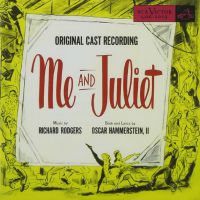 Original Broadway Cast, 1953 (RCA)
Original Broadway Cast, 1953 (RCA)  (3 / 5) It’s hard to believe, but Rodgers and Hammerstein did have a few flops in addition to their many hits. Me and Juliet was one such failure, and the team’s only foray into the backstage musical genre. Still, even this score contains flashes of brilliance. “Marriage Type Love” is a tuneful charm song with a wonderfully romantic lyric, while “That’s the Way It Happens” has just the right pithiness and nonchalance that’s called for. Probably the best and most famous item in the show is “No Other Love,” based on a theme that Rodgers originally wrote for the background score of Victory at Sea, a television documentary on World War II. It’s a lovely song with a beguiling melody, even if it is indicative of the non-character-specific writing in Me and Juliet. Many of the songs are misfires, particularly “We Deserve Each Other” and “Keep It Gay,” both of which are leaden. There is one showbiz-themed song that succeeds: “Intermission Talk.” Isabel Bigley as Jeanie heads the cast, fresh from her starring role in Guys and Dolls; Bill Hayes displays a very appealing voice as Larry; and Joan McCracken as Betty steals the show with her special brand of sassiness. — Gerard Alessandrini
(3 / 5) It’s hard to believe, but Rodgers and Hammerstein did have a few flops in addition to their many hits. Me and Juliet was one such failure, and the team’s only foray into the backstage musical genre. Still, even this score contains flashes of brilliance. “Marriage Type Love” is a tuneful charm song with a wonderfully romantic lyric, while “That’s the Way It Happens” has just the right pithiness and nonchalance that’s called for. Probably the best and most famous item in the show is “No Other Love,” based on a theme that Rodgers originally wrote for the background score of Victory at Sea, a television documentary on World War II. It’s a lovely song with a beguiling melody, even if it is indicative of the non-character-specific writing in Me and Juliet. Many of the songs are misfires, particularly “We Deserve Each Other” and “Keep It Gay,” both of which are leaden. There is one showbiz-themed song that succeeds: “Intermission Talk.” Isabel Bigley as Jeanie heads the cast, fresh from her starring role in Guys and Dolls; Bill Hayes displays a very appealing voice as Larry; and Joan McCracken as Betty steals the show with her special brand of sassiness. — Gerard Alessandrini
Category Archives: L-M
Mayor
 Original Off-Broadway Cast, 1985 (Harbinger)
Original Off-Broadway Cast, 1985 (Harbinger)  (2 / 5) When Bye Bye Birdie exploded on Broadway in 1960, it was an announcement that a brand-new generation had arrived in just about every department. Since then, composer Charles Strouse has had an interesting time of it. He has written the music for more shows than any of his contemporaries, and while most of them were box-office failures, his three big hits — Bye Bye Birdie, Applause, and Annie — have more than made up for the missteps. And even his flops have been filled with terrific songs. That said, Mayor has what may be the least interesting tunes of Strouse’s career. Based on New York City mayor Ed Koch’s book of the same title, and produced while he was still in office, the musical doesn’t take advantage of the spikiness of Koch’s personality; it’s a bland, fairly generic revue that covers familiar NYC subject matter, attitudes, and stereotypes. Unusually, Strouse wrote his own lyrics for this show, and they’re okay, but there’s not much in the way of a fresh point of view here. The book is by Warren Leight, who won a Tony Award for his play Side Man 14 years later. — David Wolf
(2 / 5) When Bye Bye Birdie exploded on Broadway in 1960, it was an announcement that a brand-new generation had arrived in just about every department. Since then, composer Charles Strouse has had an interesting time of it. He has written the music for more shows than any of his contemporaries, and while most of them were box-office failures, his three big hits — Bye Bye Birdie, Applause, and Annie — have more than made up for the missteps. And even his flops have been filled with terrific songs. That said, Mayor has what may be the least interesting tunes of Strouse’s career. Based on New York City mayor Ed Koch’s book of the same title, and produced while he was still in office, the musical doesn’t take advantage of the spikiness of Koch’s personality; it’s a bland, fairly generic revue that covers familiar NYC subject matter, attitudes, and stereotypes. Unusually, Strouse wrote his own lyrics for this show, and they’re okay, but there’s not much in the way of a fresh point of view here. The book is by Warren Leight, who won a Tony Award for his play Side Man 14 years later. — David Wolf
Mata Hari
 Off-Broadway Cast, 2001 (Original Cast Records)
Off-Broadway Cast, 2001 (Original Cast Records)  (4 / 5) The legendary 1967 out-of-town closing performance of this show is notorious for its title character, played by one Marissa Mell, being shot by a firing squad, falling, dying — and then rubbing her itchy nose when she was supposed to be stone-cold dead. In a strange way, Mell’s move has proven to be a good metaphor for this musical, which has refused to die. In 2001, the cast of the York Theatre Company revival recorded the stirring score — unfortunately, with synthesized accompaniment. (No show should use synthesizers if it’s set in an era before synthesizers were invented!) But even those machines can’t destroy Edward Thomas’s strong melodies, which are wed to deft, incisive lyrics by Martin Charnin. Mata Hari (Robin Skye) has a terrific opening song, “Everyone Has Something to Hide,” and the equally effective “Not Now, Not Here.” Captain LaFarge (Michael Zaslow), her would-be capturer/romantic interest, has the pungent “Is This Fact?” and the wistful “How Young You Were Tonight.” The jewel of the score is “Maman.” If only it didn’t sound like the singers were accompanied by automobile horns! — Peter Filichia
(4 / 5) The legendary 1967 out-of-town closing performance of this show is notorious for its title character, played by one Marissa Mell, being shot by a firing squad, falling, dying — and then rubbing her itchy nose when she was supposed to be stone-cold dead. In a strange way, Mell’s move has proven to be a good metaphor for this musical, which has refused to die. In 2001, the cast of the York Theatre Company revival recorded the stirring score — unfortunately, with synthesized accompaniment. (No show should use synthesizers if it’s set in an era before synthesizers were invented!) But even those machines can’t destroy Edward Thomas’s strong melodies, which are wed to deft, incisive lyrics by Martin Charnin. Mata Hari (Robin Skye) has a terrific opening song, “Everyone Has Something to Hide,” and the equally effective “Not Now, Not Here.” Captain LaFarge (Michael Zaslow), her would-be capturer/romantic interest, has the pungent “Is This Fact?” and the wistful “How Young You Were Tonight.” The jewel of the score is “Maman.” If only it didn’t sound like the singers were accompanied by automobile horns! — Peter Filichia
Martin Guerre
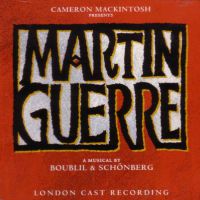 Original London Cast, 1996 (Dreamworks)
Original London Cast, 1996 (Dreamworks)  (4 / 5) By the time this latest epic from composer Claude-Michel Schönberg and lyricist Alain Boublil arrived on the scene, the serious pop-opera genre was fading away. That’s too bad, as this is one of the best scores of its type. The book for the show, also by Boublil & Schönberg, was inspired by a historical incident best known for its dramatic treatment in the film The Return of Martin Guerre. The title character, a 16th-century French farmer, is forced into marriage with a young woman, Bertrande, in order to consolidate their Catholic families’ hold on their farmland near the village of Artigat. The marriage is a disaster and produces no children, so Martin runs off to war. Seven years later, he apparently dies on the battlefield. His companion-in-war, a man named Arnaud, subsequently visits Artigat and is mistaken for Martin. Then Arnaud falls in love with Bertrande. This tale of deception is set against a background of smoldering conflict between Catholics and Protestants. It’s a grim piece, carried along by the sweep of Schönberg’s frequently ravishing melodies. Boublil’s lyrics — translated by Herbert Kretzmer, Edward Hardy, and Stephen Clark — are often cruelly pointed, and they serve the story well. The best numbers include the title song; “Here Comes the Morning,” a duet for Martin and Arnaud; “Tell Me to Go,” Arnaud’s plea to Bertrande; and the stunning choral number “The Imposters.” These and some grandly scaled orchestral interludes give Martin Guerre the scale of a true opera. (Skip the one egregious attempt at humor, “Sleeping on Our Own,” delivered by a trio of comic crones.) As Arnaud and Bertrande, lain Glen and Juliette Caton sing beautifully. They receive strong support from Matt Rawle in the title role and Jérôme Pradon as Guillame, who loves Bertrande from afar. — David Barbour
(4 / 5) By the time this latest epic from composer Claude-Michel Schönberg and lyricist Alain Boublil arrived on the scene, the serious pop-opera genre was fading away. That’s too bad, as this is one of the best scores of its type. The book for the show, also by Boublil & Schönberg, was inspired by a historical incident best known for its dramatic treatment in the film The Return of Martin Guerre. The title character, a 16th-century French farmer, is forced into marriage with a young woman, Bertrande, in order to consolidate their Catholic families’ hold on their farmland near the village of Artigat. The marriage is a disaster and produces no children, so Martin runs off to war. Seven years later, he apparently dies on the battlefield. His companion-in-war, a man named Arnaud, subsequently visits Artigat and is mistaken for Martin. Then Arnaud falls in love with Bertrande. This tale of deception is set against a background of smoldering conflict between Catholics and Protestants. It’s a grim piece, carried along by the sweep of Schönberg’s frequently ravishing melodies. Boublil’s lyrics — translated by Herbert Kretzmer, Edward Hardy, and Stephen Clark — are often cruelly pointed, and they serve the story well. The best numbers include the title song; “Here Comes the Morning,” a duet for Martin and Arnaud; “Tell Me to Go,” Arnaud’s plea to Bertrande; and the stunning choral number “The Imposters.” These and some grandly scaled orchestral interludes give Martin Guerre the scale of a true opera. (Skip the one egregious attempt at humor, “Sleeping on Our Own,” delivered by a trio of comic crones.) As Arnaud and Bertrande, lain Glen and Juliette Caton sing beautifully. They receive strong support from Matt Rawle in the title role and Jérôme Pradon as Guillame, who loves Bertrande from afar. — David Barbour
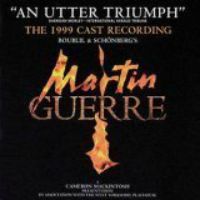 Touring Cast, 1999 (Dreamworks)
Touring Cast, 1999 (Dreamworks)  (3 / 5) After Martin Guerre failed in the West End, producer Cameron Mackintosh tried again. He had Boublil and Schönberg create a new touring version that represents one of the most extensive overhauls of any musical. Even though it follows the same general plot line, it’s an almost total rewrite, with many new songs and with melodies from the 1996 version reassigned and given new lyrics. The result is harsher, focusing even more on the religious strife that’s tearing Artigat apart. If at times the score is shrill, even hysterical, there’s plenty of dramatic power here. Alas, Stephen Clark alone translated the lyrics for the revised show, and they’re much weaker. For example, the new ballad “Live With Someone You Love” is a thesaurus of clichés. On the other hand, “Without You as a Friend” is a canny addition to the score. The title song and “The Imposters” are both still here (albeit with new lyrics), along with many other effective numbers, but William David Brohn’s orchestrations lack majesty. The new cast — Stephen Weller as Martin, Matthew Cammelle as Arnaud, Joanna Riding as Bertrande, Maurice Clark as Guillaume — is vocally skilled and dramatically apt. — D.B.
(3 / 5) After Martin Guerre failed in the West End, producer Cameron Mackintosh tried again. He had Boublil and Schönberg create a new touring version that represents one of the most extensive overhauls of any musical. Even though it follows the same general plot line, it’s an almost total rewrite, with many new songs and with melodies from the 1996 version reassigned and given new lyrics. The result is harsher, focusing even more on the religious strife that’s tearing Artigat apart. If at times the score is shrill, even hysterical, there’s plenty of dramatic power here. Alas, Stephen Clark alone translated the lyrics for the revised show, and they’re much weaker. For example, the new ballad “Live With Someone You Love” is a thesaurus of clichés. On the other hand, “Without You as a Friend” is a canny addition to the score. The title song and “The Imposters” are both still here (albeit with new lyrics), along with many other effective numbers, but William David Brohn’s orchestrations lack majesty. The new cast — Stephen Weller as Martin, Matthew Cammelle as Arnaud, Joanna Riding as Bertrande, Maurice Clark as Guillaume — is vocally skilled and dramatically apt. — D.B.
Marry Me a Little
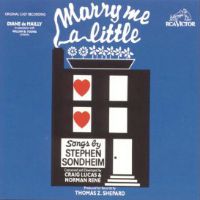 Original Off-Broadway Cast, 1981 (RCA)
Original Off-Broadway Cast, 1981 (RCA) (1 / 5) Stephen Sondheim compilation shows have always seemed silly to me. Doesn’t the appeal of his work lie largely in its specificity? The original cast album of Marry Me a Little is one of the most plodding, monotonous, and annoying recordings of Sondheim’s songs ever released. The show doesn’t have much of a story, but it does have a concept: On a Saturday evening, a man (played by Craig Lucas) and a woman (Suzanne Henry) who don’t know each other (and who never meet) sit home in their respective apartments and sing Sondheim songs. Among them: “Can That Boy Foxtrot!” and “Uptown, Downtown” (both cut from Follies), the title song and “Happily Ever After” (both cut from Company, although “Marry Me a Little” has been reinstated for subsequent productions of that show), and “There Won’t Be Trumpets” (cut from Anyone Can Whistle, but reinstated for various revivals and concert presentations of that show) . These items are interesting and worth knowing, but that doesn’t mean they work in this context. That said, the only truly unbearable section of the album is an insufferable combination of “All Things Bright and Beautiful” (Follies) and “Bang!” (A Little Night Music). Although the singing voices of Lucas and Henry are generally lacking in distinction, these two do a somewhat better job in other numbers — but they’re never aided by the cool, impersonal, distant-sounding accompaniment of a lone piano. — Matthew Murray
(1 / 5) Stephen Sondheim compilation shows have always seemed silly to me. Doesn’t the appeal of his work lie largely in its specificity? The original cast album of Marry Me a Little is one of the most plodding, monotonous, and annoying recordings of Sondheim’s songs ever released. The show doesn’t have much of a story, but it does have a concept: On a Saturday evening, a man (played by Craig Lucas) and a woman (Suzanne Henry) who don’t know each other (and who never meet) sit home in their respective apartments and sing Sondheim songs. Among them: “Can That Boy Foxtrot!” and “Uptown, Downtown” (both cut from Follies), the title song and “Happily Ever After” (both cut from Company, although “Marry Me a Little” has been reinstated for subsequent productions of that show), and “There Won’t Be Trumpets” (cut from Anyone Can Whistle, but reinstated for various revivals and concert presentations of that show) . These items are interesting and worth knowing, but that doesn’t mean they work in this context. That said, the only truly unbearable section of the album is an insufferable combination of “All Things Bright and Beautiful” (Follies) and “Bang!” (A Little Night Music). Although the singing voices of Lucas and Henry are generally lacking in distinction, these two do a somewhat better job in other numbers — but they’re never aided by the cool, impersonal, distant-sounding accompaniment of a lone piano. — Matthew Murray
Marie Christine
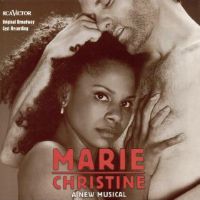 Original Broadway Cast, 2000 (RCA)
Original Broadway Cast, 2000 (RCA)  (3 / 5) Michael John LaChiusa turns out songs quickly — so quickly, he boasts, that he can sometimes knock off several in a day. There’s nothing necessarily wrong with that, but it is a problem when the songs don’t sound so much effortless as hurried, and there’s a strong whiff of that here. LaChiusa has a gift for ravishing melody, but he cuts corners by not bothering to develop the themes and motifs into rounded songs. Seemingly allergic to the traditional 32-bar structure, he prefers to construct his scores as ever-evolving fragments of music. Sometimes it works, and sometimes it can strike the listener as continual songus interruptus. Some parts click and other parts don’t in Marie Christine, a transplant of Euripides’ Medea to New Orleans and Chicago at the turn of the 19th century. The murderous mom here is a Creole with magical powers, who gets involved with a politically ambitious man. When the cad realizes that the liaison could stymie his career, he dumps Marie Christine for a politico’s daughter, and suffers the dumpee’s wrath. LaChiusa’s great fortune is in having Audra McDonald apply her gorgeous voice to his concoctions. She sings beautifully in “Beautiful” and tops herself in a flowing chanson titled “C’est I’amour.” Also shining like diamonds in a flawed setting are Darius de Haas in “Complainte de Lord Pierrot” (from a Jules LaForgue poem), and the always lusty Mary Testa as a toddlin’ town madam. The orchestrations, subtle and authoritative throughout, are by Jonathan Tunick. — David Finkle
(3 / 5) Michael John LaChiusa turns out songs quickly — so quickly, he boasts, that he can sometimes knock off several in a day. There’s nothing necessarily wrong with that, but it is a problem when the songs don’t sound so much effortless as hurried, and there’s a strong whiff of that here. LaChiusa has a gift for ravishing melody, but he cuts corners by not bothering to develop the themes and motifs into rounded songs. Seemingly allergic to the traditional 32-bar structure, he prefers to construct his scores as ever-evolving fragments of music. Sometimes it works, and sometimes it can strike the listener as continual songus interruptus. Some parts click and other parts don’t in Marie Christine, a transplant of Euripides’ Medea to New Orleans and Chicago at the turn of the 19th century. The murderous mom here is a Creole with magical powers, who gets involved with a politically ambitious man. When the cad realizes that the liaison could stymie his career, he dumps Marie Christine for a politico’s daughter, and suffers the dumpee’s wrath. LaChiusa’s great fortune is in having Audra McDonald apply her gorgeous voice to his concoctions. She sings beautifully in “Beautiful” and tops herself in a flowing chanson titled “C’est I’amour.” Also shining like diamonds in a flawed setting are Darius de Haas in “Complainte de Lord Pierrot” (from a Jules LaForgue poem), and the always lusty Mary Testa as a toddlin’ town madam. The orchestrations, subtle and authoritative throughout, are by Jonathan Tunick. — David Finkle
A Man of No Importance
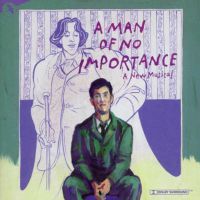 Original Off-Broadway Cast, 2002 (JAY)
Original Off-Broadway Cast, 2002 (JAY)  (2 / 5) Roger Rees did first-rate work as Alfie, a Dublin bus driver who revels in amateur theatricals and yearns for a male coworker, but this show was a disappointment. The 1994 film of the same title, a melancholy comedy about Irish eccentrics, was notable for its light touch. In contrast, Terrence McNally’s libretto for the musical consists of much hand-wringing over the fate of closeted, middle-aged, 1960s gay Irish bachelors. Still, Stephen Flaherty’s seductive tunes and Lynn Ahrens’ sharp, economical lyrics shouldn’t be dismissed. High points include the opening title-tune sequence, the rousing yet acrid “Streets of Dublin” (sung by Steven Pasquale as Alfie’s unwitting love object), and the forlorn “Love Who You Love.” Faith Prince, as Alfie’s spinster sister, has to cope with substandard material, and a pair of songs about community theater — “Going Up” and “Art” — seem like they belong in a different show. Still, the score does cast a certain spell, and when it works, it can bring tears to your eyes. A bonus track offers “Love’s Never Lost,” an expanded version of a song fragment heard in the show. — David Barbour
(2 / 5) Roger Rees did first-rate work as Alfie, a Dublin bus driver who revels in amateur theatricals and yearns for a male coworker, but this show was a disappointment. The 1994 film of the same title, a melancholy comedy about Irish eccentrics, was notable for its light touch. In contrast, Terrence McNally’s libretto for the musical consists of much hand-wringing over the fate of closeted, middle-aged, 1960s gay Irish bachelors. Still, Stephen Flaherty’s seductive tunes and Lynn Ahrens’ sharp, economical lyrics shouldn’t be dismissed. High points include the opening title-tune sequence, the rousing yet acrid “Streets of Dublin” (sung by Steven Pasquale as Alfie’s unwitting love object), and the forlorn “Love Who You Love.” Faith Prince, as Alfie’s spinster sister, has to cope with substandard material, and a pair of songs about community theater — “Going Up” and “Art” — seem like they belong in a different show. Still, the score does cast a certain spell, and when it works, it can bring tears to your eyes. A bonus track offers “Love’s Never Lost,” an expanded version of a song fragment heard in the show. — David Barbour
Man With a Load of Mischief
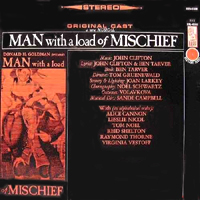 Original Off-Broadway Cast, 1966 (Kapp/no CD)
Original Off-Broadway Cast, 1966 (Kapp/no CD)  (4 / 5) For a tantalizing glimpse of the talent and creativity spawned Off-Broadway in happier times, seek out this 1966 hit, a Restoration-style comedy (though based on a minor 20th century play) that is by turns bawdy, witty, satirical, and as romantic as fine Madeira shared by the fire. It led observers to expect great things of composer-lyricist John Clifton (librettist Ben Tarver helped on the lyrics), whose melodies and harmonies are distinctive and alluring without straying too far from tradition. Sadly, one later Off-Broadway fiasco aside, Clifton’s subsequent work for the theater was minimal. That’s a pity, since vocal showpieces such as “Lover Lost,” “Goodbye, My Sweet,” and “Once You’ve Had a Little Taste” mark their composer as a natural musical storyteller with unfailing instincts as to which dramatic moments should be turned into song. On the cast album, Reid Shelton’s tenor sails easily above the staff in “Hulla-Baloo-Balay” and “Come to the Masquerade.” Virginia Vestoff acts as well as she sings in the title track and “A Wonder.” Raymond Thorne exudes patrician hauteur in “You’d Be Amazed” and “Forget!” The other three — Alice Cannon, Tom Noel, and Lesslie Nicol — are less skilled vocally, but well cast in their roles. This recording is long overdue for a digital transfer. — Marc Miller
(4 / 5) For a tantalizing glimpse of the talent and creativity spawned Off-Broadway in happier times, seek out this 1966 hit, a Restoration-style comedy (though based on a minor 20th century play) that is by turns bawdy, witty, satirical, and as romantic as fine Madeira shared by the fire. It led observers to expect great things of composer-lyricist John Clifton (librettist Ben Tarver helped on the lyrics), whose melodies and harmonies are distinctive and alluring without straying too far from tradition. Sadly, one later Off-Broadway fiasco aside, Clifton’s subsequent work for the theater was minimal. That’s a pity, since vocal showpieces such as “Lover Lost,” “Goodbye, My Sweet,” and “Once You’ve Had a Little Taste” mark their composer as a natural musical storyteller with unfailing instincts as to which dramatic moments should be turned into song. On the cast album, Reid Shelton’s tenor sails easily above the staff in “Hulla-Baloo-Balay” and “Come to the Masquerade.” Virginia Vestoff acts as well as she sings in the title track and “A Wonder.” Raymond Thorne exudes patrician hauteur in “You’d Be Amazed” and “Forget!” The other three — Alice Cannon, Tom Noel, and Lesslie Nicol — are less skilled vocally, but well cast in their roles. This recording is long overdue for a digital transfer. — Marc Miller
Lucky Stiff
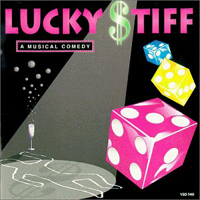 Original Off-Broadway Cast Members, 1994 (Varèse Sarabande)
Original Off-Broadway Cast Members, 1994 (Varèse Sarabande)  (3 / 5) “Promising” is the obvious word for Lucky Stiff, the first produced musical by composer Stephen Flaherty and lyricist Lynn Ahrens, but that would sell it short. It’s also professional, assured, and entertaining, if not entirely successful. The show tells the trivial story of a meek British shoe salesman who will inherit six million dollars if he agrees to take his uncle’s corpse, in a wheelchair, for one last holiday in Monte Carlo. The two are pursued (and occasionally kidnapped) by all kinds of people who, essentially, want the salesman’s money, although the pursuers each have their own particular farcical motivation. Perhaps because there’s so much convoluted plotting and exposition in this show, it’s hard not to wish that the score was a little less “integrated.” The songs are occasionally so busy doing plot work that they aren’t as much fun as they might have been. Still, they exhibit genuine skill and craft. Flaherty’s great gifts for melody and humor are already clearly in evidence, and some of Ahrens’ neatest and most effortless lyrics are to be found here. Partly because the characters are broad but not terribly rich, the accomplished farceurs who make up the cast don’t get the kind of musical moments that would elevate this show to another level, but the redoubtable Mary Testa, Evan Pappas, Judy Blazer, and Debbie (Shapiro) Gravitte come close. — David Wolf
(3 / 5) “Promising” is the obvious word for Lucky Stiff, the first produced musical by composer Stephen Flaherty and lyricist Lynn Ahrens, but that would sell it short. It’s also professional, assured, and entertaining, if not entirely successful. The show tells the trivial story of a meek British shoe salesman who will inherit six million dollars if he agrees to take his uncle’s corpse, in a wheelchair, for one last holiday in Monte Carlo. The two are pursued (and occasionally kidnapped) by all kinds of people who, essentially, want the salesman’s money, although the pursuers each have their own particular farcical motivation. Perhaps because there’s so much convoluted plotting and exposition in this show, it’s hard not to wish that the score was a little less “integrated.” The songs are occasionally so busy doing plot work that they aren’t as much fun as they might have been. Still, they exhibit genuine skill and craft. Flaherty’s great gifts for melody and humor are already clearly in evidence, and some of Ahrens’ neatest and most effortless lyrics are to be found here. Partly because the characters are broad but not terribly rich, the accomplished farceurs who make up the cast don’t get the kind of musical moments that would elevate this show to another level, but the redoubtable Mary Testa, Evan Pappas, Judy Blazer, and Debbie (Shapiro) Gravitte come close. — David Wolf
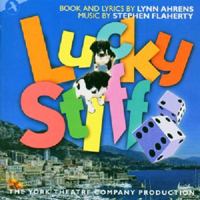 Off-Broadway Cast, 2003 (JAY)
Off-Broadway Cast, 2003 (JAY)  (3 / 5) This recording, which followed a five-performance “Musicals in Mufti” run of Lucky Stiff at the York Theatre, is better than its predecessor. The first recording was made years after the show had closed at Playwrights Horizons, without the participation of the director and with only a few of the original performers; this one has much more of a real cast album feel to it, with a company that had recently been through rehearsals and performances together. In fact, six of the 10 cast members here were also in the first production, though only two of them are heard on the original recording. All of their performances are looser, less frantic, and funnier this time around, with Mary Testa unleashed riumphantly. Among the newcomers, Janet Metz and Malcolm Gets make an appealingly believable leading couple, even if his British accent is a sometime thing. Musical director David Loud’s single-piano accompaniment is more attractive than the elaborate orchestrations of the first recording, which too often strain for comic effect. The material is mostly the same on both albums, though this one has a little more spoken dialogue, as well as the previously unrecorded Act I finale and “A Woman in My Bathroom.” In a bonus track, we get the charming “Shoes,” which was cut from the show. Both CD booklets feature uncommonly ugly cover art. — D.W.
(3 / 5) This recording, which followed a five-performance “Musicals in Mufti” run of Lucky Stiff at the York Theatre, is better than its predecessor. The first recording was made years after the show had closed at Playwrights Horizons, without the participation of the director and with only a few of the original performers; this one has much more of a real cast album feel to it, with a company that had recently been through rehearsals and performances together. In fact, six of the 10 cast members here were also in the first production, though only two of them are heard on the original recording. All of their performances are looser, less frantic, and funnier this time around, with Mary Testa unleashed riumphantly. Among the newcomers, Janet Metz and Malcolm Gets make an appealingly believable leading couple, even if his British accent is a sometime thing. Musical director David Loud’s single-piano accompaniment is more attractive than the elaborate orchestrations of the first recording, which too often strain for comic effect. The material is mostly the same on both albums, though this one has a little more spoken dialogue, as well as the previously unrecorded Act I finale and “A Woman in My Bathroom.” In a bonus track, we get the charming “Shoes,” which was cut from the show. Both CD booklets feature uncommonly ugly cover art. — D.W.
Lucky in the Rain
 Studio Cast, 2000 (DRG)
Studio Cast, 2000 (DRG)  (1 / 5) For this musical, which was seen at the Goodspeed Opera House in 1997, librettist Sherman Yellen wrapped a yarn of romance among expat American journalists in 1927 Paris around a batch of songs by Jimmy McHugh, with lyrics by Harold Adamson and Dorothy Fields. Don’t expect much; Yellen’s idea of historical realism includes Gertrude Stein singing “On the Sunny Side of the Street” and a newsroom full of reporters performing a musical tribute to Charles Lindbergh with “Comin’ In on a Wing and a Prayer.” Others passing through include Josephine Baker and Isadora Duncan. With its easily ignorable plot and most of the songs for each of the major characters sung by more than one performer, this studio cast album works best as a nod to McHugh by Broadway A-listers. Barbara Cook has several lovely tracks, but they appear to have been taken directly from her tribute album to Dorothy Fields, Close as Pages in a Book. Other notable participants are Malcolm Gets, Patrick Wilson, Debbie Gravitte, and Lillias White, but Peter Matz’s orchestrations are more evocative of a pop album than a Broadway show. —David Barbour
(1 / 5) For this musical, which was seen at the Goodspeed Opera House in 1997, librettist Sherman Yellen wrapped a yarn of romance among expat American journalists in 1927 Paris around a batch of songs by Jimmy McHugh, with lyrics by Harold Adamson and Dorothy Fields. Don’t expect much; Yellen’s idea of historical realism includes Gertrude Stein singing “On the Sunny Side of the Street” and a newsroom full of reporters performing a musical tribute to Charles Lindbergh with “Comin’ In on a Wing and a Prayer.” Others passing through include Josephine Baker and Isadora Duncan. With its easily ignorable plot and most of the songs for each of the major characters sung by more than one performer, this studio cast album works best as a nod to McHugh by Broadway A-listers. Barbara Cook has several lovely tracks, but they appear to have been taken directly from her tribute album to Dorothy Fields, Close as Pages in a Book. Other notable participants are Malcolm Gets, Patrick Wilson, Debbie Gravitte, and Lillias White, but Peter Matz’s orchestrations are more evocative of a pop album than a Broadway show. —David Barbour
Louisiana Purchase
 New York Concert Cast, 1996 (DRG)
New York Concert Cast, 1996 (DRG)  (3 / 5) This is a biting and funny satire of Louisiana’s byzantine politics in general, and of Huey Long in particular. Although Louisiana Purchase opened on Broadway in 1940 with a delightful sung disclaimer that all of its incidents were fictitious, composer-lyricist Irving Berlin and book writers Morris Ryskind and B. G. DeSylva — and, no doubt, delighted theatergoers — reveled in the show’s doses of reality-based topical material. This spirited musical had to wait more than a half-century for a recording. Fortunately, the wait was worth it. Based on a concert presentation at Weill Recital Hall in New York City, here’s a zingy and infectious performance that is more than complete; a number of cut songs, some of them quite good, were reinstated. (Who besides hard-core scholars knew of “I’d Love to Be Shot From a Cannon With You?”) Michael McGrath is aces as the wisecracking hero, Judy Blazer (with a hilarious German accent) makes a good partner for him, and veteran George S. Irving is predictably excellent in the role originally played by Victor Moore. Another veteran, Taina EIg, is charming if perhaps less assured than her part’s creator, Irene Bordoni. In a role that’s more Greek chorus than integral character, Debbie Gravitte offers some fine Broadway “can-belto.” Score-wise,this is not Annie Get Your Gun or As Thousands Cheer, but it’s a lot of fun. — Richard Barrios
(3 / 5) This is a biting and funny satire of Louisiana’s byzantine politics in general, and of Huey Long in particular. Although Louisiana Purchase opened on Broadway in 1940 with a delightful sung disclaimer that all of its incidents were fictitious, composer-lyricist Irving Berlin and book writers Morris Ryskind and B. G. DeSylva — and, no doubt, delighted theatergoers — reveled in the show’s doses of reality-based topical material. This spirited musical had to wait more than a half-century for a recording. Fortunately, the wait was worth it. Based on a concert presentation at Weill Recital Hall in New York City, here’s a zingy and infectious performance that is more than complete; a number of cut songs, some of them quite good, were reinstated. (Who besides hard-core scholars knew of “I’d Love to Be Shot From a Cannon With You?”) Michael McGrath is aces as the wisecracking hero, Judy Blazer (with a hilarious German accent) makes a good partner for him, and veteran George S. Irving is predictably excellent in the role originally played by Victor Moore. Another veteran, Taina EIg, is charming if perhaps less assured than her part’s creator, Irene Bordoni. In a role that’s more Greek chorus than integral character, Debbie Gravitte offers some fine Broadway “can-belto.” Score-wise,this is not Annie Get Your Gun or As Thousands Cheer, but it’s a lot of fun. — Richard Barrios
Lost in the Stars
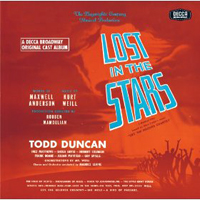 Original Broadway Cast, 1949 (Decca)
Original Broadway Cast, 1949 (Decca)  (3 / 5) Lost in the Stars, by playwright Maxwell Anderson and composer Kurt Weill, deals with racial discrimination and segregation — unlikely territory for a Broadway musical in 1940s America. With its operatic dimensions and somber tone, the show elicited mixed but largely approving notices. Weill and Anderson based their work on Alan Paton’s Cry, the Beloved Country, a 1948 novel that contrasts the natural beauty of South Africa with the brutality of its apartheid policy. As in the novel, the protagonist is a Zulu (played by Todd Duncan) ordained to the Anglican priesthood, whose son kills a white man in the course of committing a robbery and is tried for murder, convicted, and hanged. The story concludes with the reconciliation of two bereaved fathers, the black priest and the white man whose son was killed. Anderson’s Iibretto and Weill’s magnificent score take liberties with Paton’s material; in fact, after seeing Lost in the Stars, the novelist wrote that he regretted giving its adapters the rights to his book. The musical featured a Greek chorus narrating and commenting on the action. Virgil Thomson, in his review for the New York Herald Tribune, Virgil Thomson called the show a singspiel; the chorus performs an inordinate amount of the score, leaving little for the principals to do. The recording contains about 45 minutes of music, with Maurice Levine conducting a 12-piece chamber ensemble, orchestrations by Weill. The spoken dialogue is somewhat wooden, and some of the singing is weak. — Charles Wright
(3 / 5) Lost in the Stars, by playwright Maxwell Anderson and composer Kurt Weill, deals with racial discrimination and segregation — unlikely territory for a Broadway musical in 1940s America. With its operatic dimensions and somber tone, the show elicited mixed but largely approving notices. Weill and Anderson based their work on Alan Paton’s Cry, the Beloved Country, a 1948 novel that contrasts the natural beauty of South Africa with the brutality of its apartheid policy. As in the novel, the protagonist is a Zulu (played by Todd Duncan) ordained to the Anglican priesthood, whose son kills a white man in the course of committing a robbery and is tried for murder, convicted, and hanged. The story concludes with the reconciliation of two bereaved fathers, the black priest and the white man whose son was killed. Anderson’s Iibretto and Weill’s magnificent score take liberties with Paton’s material; in fact, after seeing Lost in the Stars, the novelist wrote that he regretted giving its adapters the rights to his book. The musical featured a Greek chorus narrating and commenting on the action. Virgil Thomson, in his review for the New York Herald Tribune, Virgil Thomson called the show a singspiel; the chorus performs an inordinate amount of the score, leaving little for the principals to do. The recording contains about 45 minutes of music, with Maurice Levine conducting a 12-piece chamber ensemble, orchestrations by Weill. The spoken dialogue is somewhat wooden, and some of the singing is weak. — Charles Wright
 Studio Cast, 1993 (MusicMasters Classics)
Studio Cast, 1993 (MusicMasters Classics)  (4 / 5) As general director and principal conductor of the New York City Opera in the late 1950s, Julius Rudel rescued Lost in the Stars from obscurity by introducing it into his company’s repertoire. Thirty-five years later, Rudel conducted this definitive recording of the beautiful Weill-Anderson score. Leading the Orchestra of St. Luke’s, he utilized more musicians than Weill ever envisioned, and he searched the worlds of opera and musical theater to find a dream cast. Notable among the vocalists are Arthur Woodley, who not only sings exquisitely but also brings poignancy to Stephen Kumalo’s Act II soliloquy; Cynthia Clarey, who renders “Stay Well” and “Trouble Man” with tenderness; and Carol Woods, who belts “Who’ll Buy?” with flair. But the true stars of this recording are the members of the Concert Chorale of New York and tenor Gregory Hopkins as chorus leader. While the original Broadway album retains considerable historical interest, the superior vocalism and the ample orchestral sound of Rudel’s studio version eclipses the earlier release. — C.W.
(4 / 5) As general director and principal conductor of the New York City Opera in the late 1950s, Julius Rudel rescued Lost in the Stars from obscurity by introducing it into his company’s repertoire. Thirty-five years later, Rudel conducted this definitive recording of the beautiful Weill-Anderson score. Leading the Orchestra of St. Luke’s, he utilized more musicians than Weill ever envisioned, and he searched the worlds of opera and musical theater to find a dream cast. Notable among the vocalists are Arthur Woodley, who not only sings exquisitely but also brings poignancy to Stephen Kumalo’s Act II soliloquy; Cynthia Clarey, who renders “Stay Well” and “Trouble Man” with tenderness; and Carol Woods, who belts “Who’ll Buy?” with flair. But the true stars of this recording are the members of the Concert Chorale of New York and tenor Gregory Hopkins as chorus leader. While the original Broadway album retains considerable historical interest, the superior vocalism and the ample orchestral sound of Rudel’s studio version eclipses the earlier release. — C.W.
Lorelei
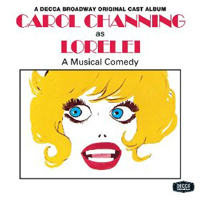 Original Broadway and Touring Cast, 1973-74 (MGM/Decca)
Original Broadway and Touring Cast, 1973-74 (MGM/Decca)  (3 / 5) Sort of a “revisal” of Gentlemen Prefer Blondes, though that word had not yet been coined when this show was staged, Lorelei had a new book and many new songs by Blondes composer Jule Styne, with lyrics by Betty Comden and Adolph Green. The star of both shows was the same, and so was the plot; a prologue and epilogue were added wherein central character Lorelei Lee reminisced about her life, to help justify the fact that Carol Channing was now too old for the role she had created 24 years earlier. The cast recorded the show before launching a year-long tour that was to precede the Broadway opening, but changes on the road led to a second recording. The first album, labeled “The Original Cast Recording” in big red letters and featuring a large drawing of Channing’s face, had three new Styne-Comden-Green songs: “Looking Back,” “Lorelei,” and “I Won’t Get Away.” There were also new lyrics for the original score’s “Sunshine,” retitled “Paris, Paris.” (Leo Robin wrote the lyrics for Gentlemen Prefer Blondes.) The second album was labeled “The Original Broadway Cast Album” in big blue lettering, with the same drawing of Channing. It added four tracks that were recorded a year after the first sessions: “It’s Delightful Down in Chile,” “Men,” a reprise of “Looking Back” leading into a reprise of “Diamonds Are a Girl’s Best Friend,” and a new overture. Inexplicably, some songs that were in the show when it reached New York were not on the album; but a new title song not performed on Broadway was included, probably to give leading man Peter Palmer more of a presence. The CD edition of Lorelei has everything that was recorded for both albums. Although the remastering is excellent, some of the tracks still sound hollow. Channing is in great voice and top form throughout. There’s not much opportunity for the other cast members to score on the recording, but Lee Roy Reams does a bang-up job with the jazzy “I Won’t Let You Get Away,” Tamara Long is a fine Dorothy, and Dody Goodman makes the most of her occasional comedic interjections. — J.D.
(3 / 5) Sort of a “revisal” of Gentlemen Prefer Blondes, though that word had not yet been coined when this show was staged, Lorelei had a new book and many new songs by Blondes composer Jule Styne, with lyrics by Betty Comden and Adolph Green. The star of both shows was the same, and so was the plot; a prologue and epilogue were added wherein central character Lorelei Lee reminisced about her life, to help justify the fact that Carol Channing was now too old for the role she had created 24 years earlier. The cast recorded the show before launching a year-long tour that was to precede the Broadway opening, but changes on the road led to a second recording. The first album, labeled “The Original Cast Recording” in big red letters and featuring a large drawing of Channing’s face, had three new Styne-Comden-Green songs: “Looking Back,” “Lorelei,” and “I Won’t Get Away.” There were also new lyrics for the original score’s “Sunshine,” retitled “Paris, Paris.” (Leo Robin wrote the lyrics for Gentlemen Prefer Blondes.) The second album was labeled “The Original Broadway Cast Album” in big blue lettering, with the same drawing of Channing. It added four tracks that were recorded a year after the first sessions: “It’s Delightful Down in Chile,” “Men,” a reprise of “Looking Back” leading into a reprise of “Diamonds Are a Girl’s Best Friend,” and a new overture. Inexplicably, some songs that were in the show when it reached New York were not on the album; but a new title song not performed on Broadway was included, probably to give leading man Peter Palmer more of a presence. The CD edition of Lorelei has everything that was recorded for both albums. Although the remastering is excellent, some of the tracks still sound hollow. Channing is in great voice and top form throughout. There’s not much opportunity for the other cast members to score on the recording, but Lee Roy Reams does a bang-up job with the jazzy “I Won’t Let You Get Away,” Tamara Long is a fine Dorothy, and Dody Goodman makes the most of her occasional comedic interjections. — J.D.
Look, Ma, I’m Dancin’!
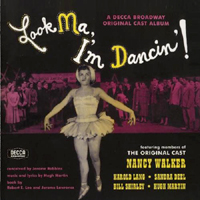 Original Broadway Cast, 1948 (Decca)
Original Broadway Cast, 1948 (Decca)  (3 / 5) Based on an idea by Jerome Robbins, Look, Ma, I’m Dancin’! was a broad musical comedy about a touring ballet company. It starred the incredibly gifted Broadway clown Nancy Walker, later well known for her work on television. At 4’10”, Walker made her entrance in the show leading a Russian wolfhound that was nearly as tall as she was. She played an heiress whose money pays for the tour, thereby securing her place as the latest addition to the corps de ballet. The other main character, played by Harold Lang, is a young choreographer’s who’s brilliant but generally loathed, even by the girl who loves him. The show comprised three love stories, but the eight Hugh Martin songs on this album, all lightly swinging, do not reveal any sense of plot. Walker gets two solid comic pieces, “I’m the First Girl in the Second Row in the Third Scene in the Fourth Number, in Fifth Position” and “I’m Tired of Texas,” plus the more romantic, upbeat “If You’ll Be Mine.” Lang sings the irrepressible “Gotta Dance” and the self-reflective “I’m Not So Bright.” Composer Martin is heard here performing the odd “Little Boy Blues” with Sandra Deel, who also sings “Shauny O’Shea,” though Deel did neither number in the New York production. Bill Shirley didn’t make it to opening night, but he has two numbers on the album, which was recorded during rehearsals to avoid a pending musicians’ strike. If you’re looking for more of this show, the Ben Bagley CD Ballet on Broadway has the “Mlle. Scandale Ballet” — David Wolf
(3 / 5) Based on an idea by Jerome Robbins, Look, Ma, I’m Dancin’! was a broad musical comedy about a touring ballet company. It starred the incredibly gifted Broadway clown Nancy Walker, later well known for her work on television. At 4’10”, Walker made her entrance in the show leading a Russian wolfhound that was nearly as tall as she was. She played an heiress whose money pays for the tour, thereby securing her place as the latest addition to the corps de ballet. The other main character, played by Harold Lang, is a young choreographer’s who’s brilliant but generally loathed, even by the girl who loves him. The show comprised three love stories, but the eight Hugh Martin songs on this album, all lightly swinging, do not reveal any sense of plot. Walker gets two solid comic pieces, “I’m the First Girl in the Second Row in the Third Scene in the Fourth Number, in Fifth Position” and “I’m Tired of Texas,” plus the more romantic, upbeat “If You’ll Be Mine.” Lang sings the irrepressible “Gotta Dance” and the self-reflective “I’m Not So Bright.” Composer Martin is heard here performing the odd “Little Boy Blues” with Sandra Deel, who also sings “Shauny O’Shea,” though Deel did neither number in the New York production. Bill Shirley didn’t make it to opening night, but he has two numbers on the album, which was recorded during rehearsals to avoid a pending musicians’ strike. If you’re looking for more of this show, the Ben Bagley CD Ballet on Broadway has the “Mlle. Scandale Ballet” — David Wolf
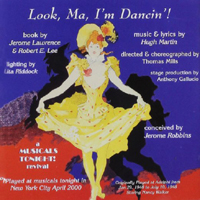 Off-Broadway Concert Cast, 2000 (Original Cast Records)
Off-Broadway Concert Cast, 2000 (Original Cast Records)  (2 / 5) Musicals Tonight! is a very well-meaning New York company that mounts concert performances of old musicals. It consistently chooses the most interesting titles of all the NYC concert-musical series, and its tickets are far less expensive than any of the others. This recording documents the group’s presentation of Look, Ma, I’m Dancin’! — apparently, the first since the original Broadway run. I’m fond of this material and Hugh Martin’s writing in general, but I can’t say that this album is very impressive, even if it does include five songs that are not to be found on the Broadway cast album. Except for Rob Lorey, none of the performers here sings with any distinctive sense of character. — D.W.
(2 / 5) Musicals Tonight! is a very well-meaning New York company that mounts concert performances of old musicals. It consistently chooses the most interesting titles of all the NYC concert-musical series, and its tickets are far less expensive than any of the others. This recording documents the group’s presentation of Look, Ma, I’m Dancin’! — apparently, the first since the original Broadway run. I’m fond of this material and Hugh Martin’s writing in general, but I can’t say that this album is very impressive, even if it does include five songs that are not to be found on the Broadway cast album. Except for Rob Lorey, none of the performers here sings with any distinctive sense of character. — D.W.
The Littlest Revue
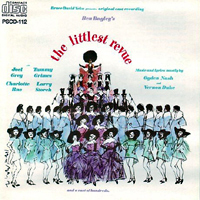 Original Off-Broadway Cast, 1956 (Painted Smiles)
Original Off-Broadway Cast, 1956 (Painted Smiles)  (4 / 5) The vibrant overture on this recording tells us that we’re about to hear one of the tangiest revues of the 1950s. Ben Bagley produced the show. Most of the songs are by Vernon Duke and Ogden Nash, and those that aren’t are by then-unknowns who wouldn’t stay unknown for long: Charles Strouse, Lee Adams, and Sheldon Harnick, to name just three. The hilarious “Backer’s Audition” opener is the work of orchestrator John Strauss, Kenward Elmslie, and John Latouche. The cast is uneven but pretty terrific overall. A young Tammy Grimes is already mannered and throaty, but who cares when she’s introducing “I’m Glad I’m Not a Man,” with Nash rhymes like “battle-axe” / “Cadillacs.” Joel Grey has fun with the mock-Belafonte number “I Lost the Rhythm” (music and lyrics by Strouse). And everything Charlotte Rae touches turns to gold. She’s warm and distinctive in the Duke-Nash song “Summer Is a-Comin’ In,” zany in Harnick’s “The Shape of Things,” devastating in Bud McCreery’s “The Power of Negative Thinking,” and triumphant in “Spring Doth Let Her Colours Fly.” That last-named item, an impudent Strouse-Adams spoof of Helen Traubel’s Las Vegas act, may be the single funniest song from any ’50s revue. The other performers aren’t quite of the Grimes-Grey-Rae caliber; Beverly Bozeman over-belts “Good Little Girls,” and Tommy Morton, more a dancer than a singer, bobbles the fine, odd Duke-Nash ballad “Born Too Late.” But the material, including a couple of CD bonus tracks, is so strong that one columnist was moved to call the show “the My Fair Lady of the intimate revue.” That’s not much of an exaggeration. — Marc Miller
(4 / 5) The vibrant overture on this recording tells us that we’re about to hear one of the tangiest revues of the 1950s. Ben Bagley produced the show. Most of the songs are by Vernon Duke and Ogden Nash, and those that aren’t are by then-unknowns who wouldn’t stay unknown for long: Charles Strouse, Lee Adams, and Sheldon Harnick, to name just three. The hilarious “Backer’s Audition” opener is the work of orchestrator John Strauss, Kenward Elmslie, and John Latouche. The cast is uneven but pretty terrific overall. A young Tammy Grimes is already mannered and throaty, but who cares when she’s introducing “I’m Glad I’m Not a Man,” with Nash rhymes like “battle-axe” / “Cadillacs.” Joel Grey has fun with the mock-Belafonte number “I Lost the Rhythm” (music and lyrics by Strouse). And everything Charlotte Rae touches turns to gold. She’s warm and distinctive in the Duke-Nash song “Summer Is a-Comin’ In,” zany in Harnick’s “The Shape of Things,” devastating in Bud McCreery’s “The Power of Negative Thinking,” and triumphant in “Spring Doth Let Her Colours Fly.” That last-named item, an impudent Strouse-Adams spoof of Helen Traubel’s Las Vegas act, may be the single funniest song from any ’50s revue. The other performers aren’t quite of the Grimes-Grey-Rae caliber; Beverly Bozeman over-belts “Good Little Girls,” and Tommy Morton, more a dancer than a singer, bobbles the fine, odd Duke-Nash ballad “Born Too Late.” But the material, including a couple of CD bonus tracks, is so strong that one columnist was moved to call the show “the My Fair Lady of the intimate revue.” That’s not much of an exaggeration. — Marc Miller
Little Shop of Horrors
 Original Off-Broadway Cast, 1982 (Geffen)
Original Off-Broadway Cast, 1982 (Geffen)  (4 / 5) Who would have thought that Roger Corman and Charles B. Griffith’s campy 1960 horror flick about a bloodthirsty plant out for world conquest would make such a delightful musical? The original cast recording of Little Shop of Horrors beautifully demonstrates why this show has become a modern classic. The score, with lyrics by Howard Ashman and music by Alan Menken, is a treasure; it charmingly combines evocative, early-’60s pop/rock song styles with theatricality so solid that the “girl group” sound of the catchy title song and the driving Motown beat of “Git It” don’t sound out of place next to the sweetly heartfelt “Somewhere That’s Green” or the soaring duet “Suddenly Seymour.” Then there’s a wonderful cast. Lee Wilkof is just right as the nebbishy Seymour, who tends to the carnivorous Audrey II (soulfully voiced by Ron Taylor). Hy Anzell is fine as flower-shop owner Mushnik; Franc Luz plays a variety of bit parts successfully, including the sadistic biker dentist; and Sheila Kay Davis, Jennifer Leigh Warren, and Leilani Jones are great as the close-harmony singing, Greek-choruslike urchins. Finally, there’s Ellen Greene, her unique talents perfectly matched to the role of the abused yet ever-hopeful Audrey. Greene perfectly melds trashiness with vulnerability while singing beautifully. It’s disappointing that one full song, an important reprise, and small sections of other numbers are omitted from this cast album, and included is a version of “Mushnik and Son” that was later replaced. These changes make it an incomplete record of the material that most people will see performed in revivals, but what’s here is presented well enough to forgive what’s not. — Matthew Murray
(4 / 5) Who would have thought that Roger Corman and Charles B. Griffith’s campy 1960 horror flick about a bloodthirsty plant out for world conquest would make such a delightful musical? The original cast recording of Little Shop of Horrors beautifully demonstrates why this show has become a modern classic. The score, with lyrics by Howard Ashman and music by Alan Menken, is a treasure; it charmingly combines evocative, early-’60s pop/rock song styles with theatricality so solid that the “girl group” sound of the catchy title song and the driving Motown beat of “Git It” don’t sound out of place next to the sweetly heartfelt “Somewhere That’s Green” or the soaring duet “Suddenly Seymour.” Then there’s a wonderful cast. Lee Wilkof is just right as the nebbishy Seymour, who tends to the carnivorous Audrey II (soulfully voiced by Ron Taylor). Hy Anzell is fine as flower-shop owner Mushnik; Franc Luz plays a variety of bit parts successfully, including the sadistic biker dentist; and Sheila Kay Davis, Jennifer Leigh Warren, and Leilani Jones are great as the close-harmony singing, Greek-choruslike urchins. Finally, there’s Ellen Greene, her unique talents perfectly matched to the role of the abused yet ever-hopeful Audrey. Greene perfectly melds trashiness with vulnerability while singing beautifully. It’s disappointing that one full song, an important reprise, and small sections of other numbers are omitted from this cast album, and included is a version of “Mushnik and Son” that was later replaced. These changes make it an incomplete record of the material that most people will see performed in revivals, but what’s here is presented well enough to forgive what’s not. — Matthew Murray
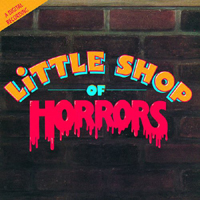 Film Soundtrack, 1986 (Geffen)
Film Soundtrack, 1986 (Geffen)  (3 / 5) All things considered, the film adaptation of Little Shop of Horrors is excellent: bright, funny, thoughtfully directed by Frank Oz, and well performed by a cast that features Rick Moranis as Seymour, the irreplaceable Ellen Greene as Audrey, and Steve Martin in a riotous performance as the dentist. Among the changes for the film, all of Mushnik’s songs are cut, and “Some Fun Now” replaces “Ya Never Know.” The new song “Mean Green Mother from Outer Space” is fine, but not as exciting as “Don’t Feed the Plants.” Note also that the soundtrack album’s spoken prologue and “Skid Row” have minor but noticeable differences from what’s heard in the film, and “The Meek Shall Inherit” doesn’t reflect the movie’s cuts. Happily, while the score retains most of its original intimacy, it sounds better than ever with full orchestrations by Bob Gaudio, Thomas Pasatieri, and original orchestrator Robby Merkin; “Suddenly Seymour” is particularly thrilling. — M.M.
(3 / 5) All things considered, the film adaptation of Little Shop of Horrors is excellent: bright, funny, thoughtfully directed by Frank Oz, and well performed by a cast that features Rick Moranis as Seymour, the irreplaceable Ellen Greene as Audrey, and Steve Martin in a riotous performance as the dentist. Among the changes for the film, all of Mushnik’s songs are cut, and “Some Fun Now” replaces “Ya Never Know.” The new song “Mean Green Mother from Outer Space” is fine, but not as exciting as “Don’t Feed the Plants.” Note also that the soundtrack album’s spoken prologue and “Skid Row” have minor but noticeable differences from what’s heard in the film, and “The Meek Shall Inherit” doesn’t reflect the movie’s cuts. Happily, while the score retains most of its original intimacy, it sounds better than ever with full orchestrations by Bob Gaudio, Thomas Pasatieri, and original orchestrator Robby Merkin; “Suddenly Seymour” is particularly thrilling. — M.M.
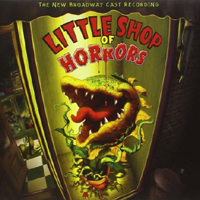 Broadway Cast, 2003 (DRG)
Broadway Cast, 2003 (DRG)  (3 / 5) This recording is commendable for its completeness. Everything in the score is here, including “Mushnik & Son ” (with the now-standard lyrics), “Call Back in the Morning,” Audrey’s “Somewhere That’s Green” reprise, and even the “Shing-a-ling” first act finale. While some of the show’s sweet simplicity was sacrificed in favor of bigger takes on everything for the Broadway revival, Little Shop fans will want this cast album to be part of their collection despite its minor flaws. There are a few musical changes — most significantly, the use of the movie version’s extended title song. Danny Troob’s orchestrations lack the appeal of Robby Merkin’s, and some of the casting, particularly Hunter Foster as Seymour and Kerry Butler as Audrey, is more functional than ideal. Still, the recording is very well done, and it includes five bonus tracks of demos/cut songs sung by Menken, Ashman, and original Audrey II voice Ron Taylor. — M.M.
(3 / 5) This recording is commendable for its completeness. Everything in the score is here, including “Mushnik & Son ” (with the now-standard lyrics), “Call Back in the Morning,” Audrey’s “Somewhere That’s Green” reprise, and even the “Shing-a-ling” first act finale. While some of the show’s sweet simplicity was sacrificed in favor of bigger takes on everything for the Broadway revival, Little Shop fans will want this cast album to be part of their collection despite its minor flaws. There are a few musical changes — most significantly, the use of the movie version’s extended title song. Danny Troob’s orchestrations lack the appeal of Robby Merkin’s, and some of the casting, particularly Hunter Foster as Seymour and Kerry Butler as Audrey, is more functional than ideal. Still, the recording is very well done, and it includes five bonus tracks of demos/cut songs sung by Menken, Ashman, and original Audrey II voice Ron Taylor. — M.M.
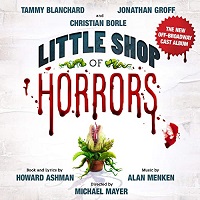 Off-Broadway Cast, 2019 (Ghostlight)
Off-Broadway Cast, 2019 (Ghostlight)  (4 / 5) As per the show’s marketing, a 2019 revival returned Little Shop of Horrors to its Off-Broadway “roots” (get it?), playing at the intimate Westside Theatre on far West 43rd Street in a very well received production directed by Michael Mayer and starring Jonathan Groff as Seymour, Tammy Blanchard as Audrey, and Christian Borle as Orin Scrivello, DDS. Happily, the mistakes that were made for the pumped-up Broadway presentation of 2003 were not replicated here, and the show was a big hit in its run at the Westside until it had to close indefinitely due to the COVID-19 crisis of 2020. The score, as heard in Will Van Dyke’s fine new arrangements/orchestrations, is lovingly presented, and the leads are every inch as appealing a couple as they need to be; though some Little Shop fans may be nonplussed by Groff’s lack of a New York accent in the role, his Seymour is arguably the most warmly sung on record, while Blanchard’s Audrey is only a slight disappointment in that her limitations at the top of her vocal range seem to have necessitated a downward transposition of “Suddenly Seymour.” Borle is hysterically funny as the dentist of one’s nightmares, while Kingsley Leggs richly and dynamically voices Audrey II in the traditional mode. Tom Alan Robins is just right as Mushnik, and the three women who play the Urchins — Ari Groover, Salome Smith, and Joy Woods — come across as powerhouse vocalists individually and when functioning as a girl group. — Michael Portantiere
(4 / 5) As per the show’s marketing, a 2019 revival returned Little Shop of Horrors to its Off-Broadway “roots” (get it?), playing at the intimate Westside Theatre on far West 43rd Street in a very well received production directed by Michael Mayer and starring Jonathan Groff as Seymour, Tammy Blanchard as Audrey, and Christian Borle as Orin Scrivello, DDS. Happily, the mistakes that were made for the pumped-up Broadway presentation of 2003 were not replicated here, and the show was a big hit in its run at the Westside until it had to close indefinitely due to the COVID-19 crisis of 2020. The score, as heard in Will Van Dyke’s fine new arrangements/orchestrations, is lovingly presented, and the leads are every inch as appealing a couple as they need to be; though some Little Shop fans may be nonplussed by Groff’s lack of a New York accent in the role, his Seymour is arguably the most warmly sung on record, while Blanchard’s Audrey is only a slight disappointment in that her limitations at the top of her vocal range seem to have necessitated a downward transposition of “Suddenly Seymour.” Borle is hysterically funny as the dentist of one’s nightmares, while Kingsley Leggs richly and dynamically voices Audrey II in the traditional mode. Tom Alan Robins is just right as Mushnik, and the three women who play the Urchins — Ari Groover, Salome Smith, and Joy Woods — come across as powerhouse vocalists individually and when functioning as a girl group. — Michael Portantiere
A Little Night Music
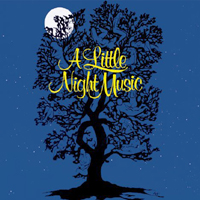 Original Broadway Cast, 1973 (Columbia/Sony)
Original Broadway Cast, 1973 (Columbia/Sony)  (5 / 5) A Little Night Music is emblematic of composer-lyricist Stephen Sondheim’s work in that it sounds very different from his other scores and yet is clearly the creation of one of the musical theater’s true geniuses. Based on Ingmar Bergman’s film Smiles of a Summer Night, with a book by Hugh Wheeler, the show features songs that are gorgeously romantic, witty, and heartbreaking by turns, all of them benefiting greatly from Jonathan Tunick’s lush orchestrations. Though excellent overall, the cast album is somewhat disappointing in that the vocal limitations of Glynis Johns as Desirée Armfeldt and Patricia Elliott as Countess Charlotte prevent them from giving fully satisfying performances of their songs. Elliott sings her lines in “Every Day a Little Death” and “A Weekend in the Country” with little or no nuance; Johns gives oddly flat readings of her semi-spoken lines in “You Must Meet My Wife,” and although her rendition of “Send in the Clowns” is heartfelt, she struggles with some of the notes because the bulk of the music lies right around her register break. However, the rest of the cast is superb. Len Cariou and Laurence Guittard sing beautifully as Frederik Egerman and Carl-Magnus Malcolm, respectively. Victoria Mallory brings a resplendent soprano to the role of Anne Egerman, yet she manages to sound convincingly young, as the character must be for the plot of this show to make sense. Ditto tenor Mark Lambert as Henrik, whose singing in “Later” and “A Weekend in the Country” is perfect in both musical and dramatic terms. Hermione Gingold’s performance of Madame Armfeldt’s “Liaisons” is full of personality, and a major highlight of the recording is D’Jamin-Bartlett’s rendition of one of the best, smartest, most deeply affecting songs in the score, “The Miller’s Son.” — Michael Portantiere
(5 / 5) A Little Night Music is emblematic of composer-lyricist Stephen Sondheim’s work in that it sounds very different from his other scores and yet is clearly the creation of one of the musical theater’s true geniuses. Based on Ingmar Bergman’s film Smiles of a Summer Night, with a book by Hugh Wheeler, the show features songs that are gorgeously romantic, witty, and heartbreaking by turns, all of them benefiting greatly from Jonathan Tunick’s lush orchestrations. Though excellent overall, the cast album is somewhat disappointing in that the vocal limitations of Glynis Johns as Desirée Armfeldt and Patricia Elliott as Countess Charlotte prevent them from giving fully satisfying performances of their songs. Elliott sings her lines in “Every Day a Little Death” and “A Weekend in the Country” with little or no nuance; Johns gives oddly flat readings of her semi-spoken lines in “You Must Meet My Wife,” and although her rendition of “Send in the Clowns” is heartfelt, she struggles with some of the notes because the bulk of the music lies right around her register break. However, the rest of the cast is superb. Len Cariou and Laurence Guittard sing beautifully as Frederik Egerman and Carl-Magnus Malcolm, respectively. Victoria Mallory brings a resplendent soprano to the role of Anne Egerman, yet she manages to sound convincingly young, as the character must be for the plot of this show to make sense. Ditto tenor Mark Lambert as Henrik, whose singing in “Later” and “A Weekend in the Country” is perfect in both musical and dramatic terms. Hermione Gingold’s performance of Madame Armfeldt’s “Liaisons” is full of personality, and a major highlight of the recording is D’Jamin-Bartlett’s rendition of one of the best, smartest, most deeply affecting songs in the score, “The Miller’s Son.” — Michael Portantiere
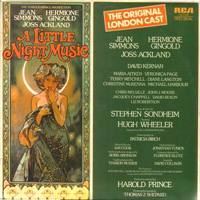 Original London Cast, 1975 (RCA)
Original London Cast, 1975 (RCA)  (3 / 5) This recording boasts fewer legit voices than the Broadway album, with even some of the Liebeslieder singers falling short in this regard. Joss Ackland simply lacks the vocal goods for the role of Frederik; the key of ”You Must Meet My Wife” has been lowered for him, but he’s still unable to sustain the high notes for more than one beat, and he sounds perfectly awful in “It Would Have Been Wonderful.” On top of all that, Ackland does an awful lot of speak-singing throughout the recording. As Anne, Veronica Page sings prettily enough except above the staff, where her voice thins out and becomes unpleasantly fluttery. David Kernan sounds fine as Carl-Magnus, as does Terry Mitchell as the tormented Henrik. Although Maria Aitken doesn’t have much more of a singing voice than Patricia Elliott of the original Broadway cast, she sounds far more emotionally involved in “Every Day a Little Death.” Jean Simmons is lovely as Desirée, her “Send in the Clowns” very persuasive; and Diane Langton thrillingly belts “The Miller’s Son” in a higher key than her Broadway predecessor, D’Jamin-Bartlett. Gingold is back as Mme. Armfeldt, and very welcome. The orchestrations are the originals for the most part, but this version of Frederik’s “Now” includes some clever little brass and woodwind interjections that are not on the Broadway album. — M.P.
(3 / 5) This recording boasts fewer legit voices than the Broadway album, with even some of the Liebeslieder singers falling short in this regard. Joss Ackland simply lacks the vocal goods for the role of Frederik; the key of ”You Must Meet My Wife” has been lowered for him, but he’s still unable to sustain the high notes for more than one beat, and he sounds perfectly awful in “It Would Have Been Wonderful.” On top of all that, Ackland does an awful lot of speak-singing throughout the recording. As Anne, Veronica Page sings prettily enough except above the staff, where her voice thins out and becomes unpleasantly fluttery. David Kernan sounds fine as Carl-Magnus, as does Terry Mitchell as the tormented Henrik. Although Maria Aitken doesn’t have much more of a singing voice than Patricia Elliott of the original Broadway cast, she sounds far more emotionally involved in “Every Day a Little Death.” Jean Simmons is lovely as Desirée, her “Send in the Clowns” very persuasive; and Diane Langton thrillingly belts “The Miller’s Son” in a higher key than her Broadway predecessor, D’Jamin-Bartlett. Gingold is back as Mme. Armfeldt, and very welcome. The orchestrations are the originals for the most part, but this version of Frederik’s “Now” includes some clever little brass and woodwind interjections that are not on the Broadway album. — M.P.
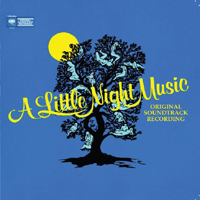 Film Soundtrack, 1977 (Columbia/Sony)
Film Soundtrack, 1977 (Columbia/Sony)  (4 / 5) A film that might have been beautiful was botched due to poor direction (by Hal Prince, who had helmed the original Broadway production of A Little Night Music but was not known as a film director) and other major flaws, most notably the casting of Elizabeth Taylor as Desirée. The movie was also sabotaged by moving the action from Sweden to Vienna, Austria, with some of the characters renamed to conform to the new locale. (Given this score’s many waltzes, the switch to Vienna may not sound like a bad idea, but it just doesn’t work.) The film does include a brilliant new version of “The Glamorous Life” for Fredrika, winsomely sung by Elaine Tomkinson (dubbing for Chloe Franks), but since that track is now to be found as a bonus item on the original Broadway album, you don’t need to buy the soundtrack recording to get it. Weirdly, Tomkinson also dubs Anne Egerman’s songs for Lesley-Anne Down. She does a fine job in both cases, but the fact that one singer ghosts two separate roles indicates how misguided the film is in general. Taylor’s rendition of “Send in the Clowns” is better than expected; her singing voice is fragile, but that arguably adds to the character’s emotional vulnerability as expressed in this famous, beautiful song. (Taylor’s singing is also dubbed by Elaine Tomkinson in the rewritten opening number, “Love Takes Time” and, it seems, for Desirée’s final line in “You Must Meet My Wife.”) A major plus here is Diana Rigg, a fabulous Charlotte. Not only does she act the character’s songs more fully than those who preceded her in the role, Rigg sings them better, too. Len Cariou and Laurence Guittard recreate their original roles but rein in their big voices for the film medium, so you’ll probably enjoy them more on the Broadway recording. Carl-Magnus’s “In Praise of Women” was cut from the movie and is not included on this album; among the other great songs missing here are “Liaisons” and “The Miller’s Son.” Gingold is back once again as Mme. Armfeldt, but with “Liaisons” gone, she doesn’t have much to do. — M.P.
(4 / 5) A film that might have been beautiful was botched due to poor direction (by Hal Prince, who had helmed the original Broadway production of A Little Night Music but was not known as a film director) and other major flaws, most notably the casting of Elizabeth Taylor as Desirée. The movie was also sabotaged by moving the action from Sweden to Vienna, Austria, with some of the characters renamed to conform to the new locale. (Given this score’s many waltzes, the switch to Vienna may not sound like a bad idea, but it just doesn’t work.) The film does include a brilliant new version of “The Glamorous Life” for Fredrika, winsomely sung by Elaine Tomkinson (dubbing for Chloe Franks), but since that track is now to be found as a bonus item on the original Broadway album, you don’t need to buy the soundtrack recording to get it. Weirdly, Tomkinson also dubs Anne Egerman’s songs for Lesley-Anne Down. She does a fine job in both cases, but the fact that one singer ghosts two separate roles indicates how misguided the film is in general. Taylor’s rendition of “Send in the Clowns” is better than expected; her singing voice is fragile, but that arguably adds to the character’s emotional vulnerability as expressed in this famous, beautiful song. (Taylor’s singing is also dubbed by Elaine Tomkinson in the rewritten opening number, “Love Takes Time” and, it seems, for Desirée’s final line in “You Must Meet My Wife.”) A major plus here is Diana Rigg, a fabulous Charlotte. Not only does she act the character’s songs more fully than those who preceded her in the role, Rigg sings them better, too. Len Cariou and Laurence Guittard recreate their original roles but rein in their big voices for the film medium, so you’ll probably enjoy them more on the Broadway recording. Carl-Magnus’s “In Praise of Women” was cut from the movie and is not included on this album; among the other great songs missing here are “Liaisons” and “The Miller’s Son.” Gingold is back once again as Mme. Armfeldt, but with “Liaisons” gone, she doesn’t have much to do. — M.P.
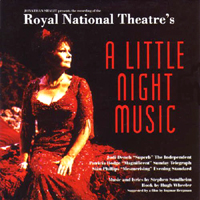 Royal National Theatre Cast, 1995 (Tring)
Royal National Theatre Cast, 1995 (Tring)  (2 / 5) This recording features two major, controversial additions to the score: Fredrika’s extended solo version of “The Glamorous Life,” a highlight of the Night Music film, and Charlotte’s “My Husband the Pig,” which was cut from the show before it opened on Broadway. Trying to shove these songs into the show score is questionable to begin with, and it’s done here with a consummate lack of skill. Fredrika’s “Glamorous Life” is broken up into sections that are interrupted by bits of the original version sung by Desirée, Madame Armfeldt, and the Liebeslieder singers, while “My Husband the Pig” is stuck into the middle of Carl-Magnus’s “In Praise of Women.” It’s surprising that Sondheim allowed any of this; the “Glamorous Life” conglomeration, in particular, is hard to listen to because it contains several bizarre modulations of key. The best thing about this album is Judi Dench, stellar in the role of Desirée. Her performance of “Send in the Clowns” is truly special, most noteworthy for the bitterness and anger that she stresses in the song’s mix of emotions. Laurence Guittard, the original Count Carl-Magnus, has here graduated to the role of Frederik, which he sings very well, while Carl-Magnus is capably sung by Lambert Wilson. Other accomplished principals are Joanna Riding as Anne, Patrica Hodge as Charlotte, Issy van Randwyck as Petra, and Siân Phillips as Mme. Armfeldt. The fly in the ointment is Brendan O’Hea as Henrik, screaming the high notes that are so beautifully rendered by Mark Lambert on the original Broadway cast album. — M.P.
(2 / 5) This recording features two major, controversial additions to the score: Fredrika’s extended solo version of “The Glamorous Life,” a highlight of the Night Music film, and Charlotte’s “My Husband the Pig,” which was cut from the show before it opened on Broadway. Trying to shove these songs into the show score is questionable to begin with, and it’s done here with a consummate lack of skill. Fredrika’s “Glamorous Life” is broken up into sections that are interrupted by bits of the original version sung by Desirée, Madame Armfeldt, and the Liebeslieder singers, while “My Husband the Pig” is stuck into the middle of Carl-Magnus’s “In Praise of Women.” It’s surprising that Sondheim allowed any of this; the “Glamorous Life” conglomeration, in particular, is hard to listen to because it contains several bizarre modulations of key. The best thing about this album is Judi Dench, stellar in the role of Desirée. Her performance of “Send in the Clowns” is truly special, most noteworthy for the bitterness and anger that she stresses in the song’s mix of emotions. Laurence Guittard, the original Count Carl-Magnus, has here graduated to the role of Frederik, which he sings very well, while Carl-Magnus is capably sung by Lambert Wilson. Other accomplished principals are Joanna Riding as Anne, Patrica Hodge as Charlotte, Issy van Randwyck as Petra, and Siân Phillips as Mme. Armfeldt. The fly in the ointment is Brendan O’Hea as Henrik, screaming the high notes that are so beautifully rendered by Mark Lambert on the original Broadway cast album. — M.P.
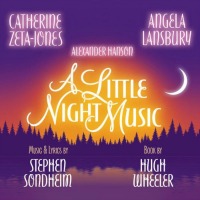 Broadway Cast, 2009 (PS Classics, 2CDs)
Broadway Cast, 2009 (PS Classics, 2CDs)  (1 / 5) While this recording is mostly unsatisfactory in its own right, by no means does it make clear just how far off the mark was the 2009 Broadway revival of A Little Night Music, disastrously misdirected by Trevor Nunn. The visual component of Nunn’s staging is, of course, absent here, nor are we subjected to David Farley’s all-wrong scenic design. The tiny “orchestra” heard on the album, though still completely inadequate for Sondheim’s glorious score, is slightly augmented in size from the pitifully minuscule group that was employed at the Walter Kerr Theatre for this production, and the general inwardness of the cast’s performances is less damaging on the recording than it was live; listen, for example, to Catherine Zeta-Jones’ and Alexander Hanson’s hyper-intimate reading of the Desirée-Frederik dialogue scene before “Send in the Clowns.” Even the one piece of miscasting among the leads, Aaron Lazar as Carl-Magnus, isn’t a major problem here, because he was wrong for the role more in terms of physical than vocal type. Somehow holding their heads above water, Zeta-Jones, Erin Davie, and Leigh Ann Larkin are quite good overall as Desirée, Charlotte, and Petra respectively, while the great Angela Lansbury is one of the best-ever Mme. Armfeldts, her performance here helped by the inclusion of so much dialogue on the recording. Faring less well due to Nunn’s misguidance is Ramona Mallory with a weird characterization of Anne, although the beauty of her singing voice is happily very much in evidence. (Ramona is the daughter of Victoria Mallory and Mark Lambert, the original Broadway Anne and Henrik.) There are sections of Henrik’s music in which Hunter Ryan Herdlicka demonstrates that he does have the vocal chops for the role, so it’s a pity that he delivers the high notes in “Later” and “A Weekend in the Country” in a blaring straight tone, presumably for “effect.” That choice may have been foisted upon Herdlicka by Nunn or by musical director Tom Murray, whose leadership is lacking in that he permits or encourages the cast members to futz with phrasing and to indulge in a fair amount of speak-singing — always a big mistake in a Sondheim score. The Liebeslieder singers have gorgeous voices, and once past the somnolent beginning of the “Night Waltz” that opens the recording, they sound wonderful throughout. — M.P.
(1 / 5) While this recording is mostly unsatisfactory in its own right, by no means does it make clear just how far off the mark was the 2009 Broadway revival of A Little Night Music, disastrously misdirected by Trevor Nunn. The visual component of Nunn’s staging is, of course, absent here, nor are we subjected to David Farley’s all-wrong scenic design. The tiny “orchestra” heard on the album, though still completely inadequate for Sondheim’s glorious score, is slightly augmented in size from the pitifully minuscule group that was employed at the Walter Kerr Theatre for this production, and the general inwardness of the cast’s performances is less damaging on the recording than it was live; listen, for example, to Catherine Zeta-Jones’ and Alexander Hanson’s hyper-intimate reading of the Desirée-Frederik dialogue scene before “Send in the Clowns.” Even the one piece of miscasting among the leads, Aaron Lazar as Carl-Magnus, isn’t a major problem here, because he was wrong for the role more in terms of physical than vocal type. Somehow holding their heads above water, Zeta-Jones, Erin Davie, and Leigh Ann Larkin are quite good overall as Desirée, Charlotte, and Petra respectively, while the great Angela Lansbury is one of the best-ever Mme. Armfeldts, her performance here helped by the inclusion of so much dialogue on the recording. Faring less well due to Nunn’s misguidance is Ramona Mallory with a weird characterization of Anne, although the beauty of her singing voice is happily very much in evidence. (Ramona is the daughter of Victoria Mallory and Mark Lambert, the original Broadway Anne and Henrik.) There are sections of Henrik’s music in which Hunter Ryan Herdlicka demonstrates that he does have the vocal chops for the role, so it’s a pity that he delivers the high notes in “Later” and “A Weekend in the Country” in a blaring straight tone, presumably for “effect.” That choice may have been foisted upon Herdlicka by Nunn or by musical director Tom Murray, whose leadership is lacking in that he permits or encourages the cast members to futz with phrasing and to indulge in a fair amount of speak-singing — always a big mistake in a Sondheim score. The Liebeslieder singers have gorgeous voices, and once past the somnolent beginning of the “Night Waltz” that opens the recording, they sound wonderful throughout. — M.P.
Little Me
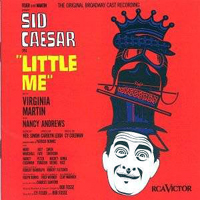 Original Broadway Cast, 1962 (RCA)
Original Broadway Cast, 1962 (RCA)  (5 / 5) This album starts with one of the most exciting overtures ever and takes off from there, thanks largely to orchestrator Ralph Burns. With Cy Coleman’s terrific, sophisticated melodies perfectly matched to Carolyn Leigh’s mind-bending word games, the entire score of Little Me is a treat. Neil Simon’s libretto, based on Patrick Dennis’ spoof of tell-all celebrity bios, is a raucous series of burlesque blackouts tracing the rise, fall, and rise of Belle Poitrine (née Schlumpfert). Our heroine’s search for “wealth, culture, and social position” leads to numerous misadventures, including the annihilation of most of her lovers — all of whom were embodied in the original production by the great comic Sid Caesar. In terms of energy and wit, the score is simply unforgettable. The opening number, in which an older Belle (Nancy Andrews) announces her plan to pen her memoirs, sets the perfect tone of genial satire. Other gems include the poor girl’s manifesto “The Other Side of the Tracks,” in which Virginia Martin as Young Belle unleashes her astonishing belt, and “Deep Down Inside,” with Young Belle innocently vamping a superannuated miser played by Caesar. In the hands of Swen Swenson, the sizzling “I’ve Got Your Number” is one of the sexiest tracks on any cast album. Three ballads also stand out: the Tinseltown lament “Poor Little Hollywood Star,” the delightful “Real Live Girl,” and the notably fatalistic “Here’s to Us.” And when the two Belles merge to sing the title song, watch out! One irony is that Caesar, in his only Broadway musical, is somewhat overshadowed on disc by Martin and Andrews, but every number here is guaranteed to chase the blues away. — David Barbour
(5 / 5) This album starts with one of the most exciting overtures ever and takes off from there, thanks largely to orchestrator Ralph Burns. With Cy Coleman’s terrific, sophisticated melodies perfectly matched to Carolyn Leigh’s mind-bending word games, the entire score of Little Me is a treat. Neil Simon’s libretto, based on Patrick Dennis’ spoof of tell-all celebrity bios, is a raucous series of burlesque blackouts tracing the rise, fall, and rise of Belle Poitrine (née Schlumpfert). Our heroine’s search for “wealth, culture, and social position” leads to numerous misadventures, including the annihilation of most of her lovers — all of whom were embodied in the original production by the great comic Sid Caesar. In terms of energy and wit, the score is simply unforgettable. The opening number, in which an older Belle (Nancy Andrews) announces her plan to pen her memoirs, sets the perfect tone of genial satire. Other gems include the poor girl’s manifesto “The Other Side of the Tracks,” in which Virginia Martin as Young Belle unleashes her astonishing belt, and “Deep Down Inside,” with Young Belle innocently vamping a superannuated miser played by Caesar. In the hands of Swen Swenson, the sizzling “I’ve Got Your Number” is one of the sexiest tracks on any cast album. Three ballads also stand out: the Tinseltown lament “Poor Little Hollywood Star,” the delightful “Real Live Girl,” and the notably fatalistic “Here’s to Us.” And when the two Belles merge to sing the title song, watch out! One irony is that Caesar, in his only Broadway musical, is somewhat overshadowed on disc by Martin and Andrews, but every number here is guaranteed to chase the blues away. — David Barbour
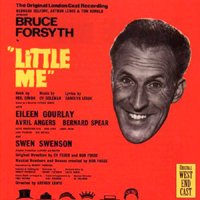 Original London Cast, 1964 (Pye/DRG)
Original London Cast, 1964 (Pye/DRG)  (3 / 5) A fair copy of the Broadway original, the London cast album of Little Me features Brit comedy star Bruce Forsyth in Sid Caesar’s roles, with Eileen Gourlay as Young Belle. They’re enthusiastic, to say the least — and the disc contains the dance number “Rich Kids Rag,” which the Broadway edition does not. Forsyth is a better singer than Caesar, but he can’t approach his predecessor’s performance as French cabaret star Val du Val in “Boom-Boom.” Swen Swenson is still on hand, but for some reason, this recording of “I’ve Got Your Number” lacks excitement. Still the cast is strong overall, and this is one London recording of an American musical that doesn’t suffer from slow tempi. It’s a good complement to the Broadway version, and it’s also interesting for the many changes in the lyrics for Brit audiences. — D.B.
(3 / 5) A fair copy of the Broadway original, the London cast album of Little Me features Brit comedy star Bruce Forsyth in Sid Caesar’s roles, with Eileen Gourlay as Young Belle. They’re enthusiastic, to say the least — and the disc contains the dance number “Rich Kids Rag,” which the Broadway edition does not. Forsyth is a better singer than Caesar, but he can’t approach his predecessor’s performance as French cabaret star Val du Val in “Boom-Boom.” Swen Swenson is still on hand, but for some reason, this recording of “I’ve Got Your Number” lacks excitement. Still the cast is strong overall, and this is one London recording of an American musical that doesn’t suffer from slow tempi. It’s a good complement to the Broadway version, and it’s also interesting for the many changes in the lyrics for Brit audiences. — D.B.
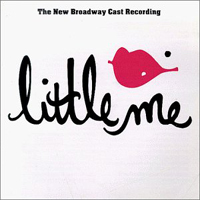 Broadway Cast, 1999 (Varèse Sarabande)
Broadway Cast, 1999 (Varèse Sarabande)  (2 / 5) Little Me is one of those musicals that its creators can’t let alone. An early-’80s Broadway revisal that divided Sid Caesar’s roles between Victor Garber and James Coco was a quick flop. For the 1999 Roundabout Theatre production, Simon again rewrote his book, combing Belle and Young Belle into one role for Faith Prince. Martin Short appeared as all the men in her life. The performance in general is brassy and far too knowing; Short’s hamming is shameless (his mangled French accent in “Boom-Boom” is very unfunny), while Prince’s breathy, overemphatic singing underlines each joke with the vocal equivalent of a magic marker. On top of all that, Harold Wheeler’s new orchestrations lack the metallic exuberance of Ralph Burns’ originals. However, the recording does include the “Rich Kids Rag, and a zesty performance of “Deep Down Inside.” Also, thanks to the inclusion of some amusing dialogue sequences, we get a better sense of the show’s plot line than what may be gleaned from the two previous recordings. — D.B.
(2 / 5) Little Me is one of those musicals that its creators can’t let alone. An early-’80s Broadway revisal that divided Sid Caesar’s roles between Victor Garber and James Coco was a quick flop. For the 1999 Roundabout Theatre production, Simon again rewrote his book, combing Belle and Young Belle into one role for Faith Prince. Martin Short appeared as all the men in her life. The performance in general is brassy and far too knowing; Short’s hamming is shameless (his mangled French accent in “Boom-Boom” is very unfunny), while Prince’s breathy, overemphatic singing underlines each joke with the vocal equivalent of a magic marker. On top of all that, Harold Wheeler’s new orchestrations lack the metallic exuberance of Ralph Burns’ originals. However, the recording does include the “Rich Kids Rag, and a zesty performance of “Deep Down Inside.” Also, thanks to the inclusion of some amusing dialogue sequences, we get a better sense of the show’s plot line than what may be gleaned from the two previous recordings. — D.B.
Little Mary Sunshine
 Original Off-Broadway Cast, 1959 (Capitol/Angel)
Original Off-Broadway Cast, 1959 (Capitol/Angel)  (5 / 5) Not too long after Sandy Wilson proved with The Boy Friend that audiences enjoyed spoofs of old musicals, Rick Besoyan wrote the book, music, and lyrics to this hilarious send-up. It ranks with the Wilson opus as head-and-shoulders above every subsequent satire of the genre. Besoyan’s target is operetta of the type that Sigmund Romberg and Victor Herbert were turning out in the early 20th century. Throughout the narrative about forest rangers, finishing-school maidens, and a few Native Americans, the clever author lines up every cliché of the art form as if setting ducks in a row, then shoots every one down with great delight. There’s the love chant (“Colorado Love Call”), the cheer-up ditty (“Look for a Sky of Blue”), the marching song (“The Forest Rangers”), the fun-time contrapuntal choral pieces (“Playing Croquet,” “Swinging,” “How Do You Do?”), the salute-to-the-old-country tune (“In Izzenschnooken on the Essenzook Zee”), the novelty number (“Mata Hari”), and a darling title song. All are tuneful and amusing. Leading the large cast, Eileen Brennan became the toast of downtown as the sunny title character, instigating lots of laughs with her silvery voice and cunning delivery. John McMartin and Elmarie Wendel are the secondary love interests. In the theater, the score was played on twin pianos, but for this recording, Capitol provided a full orchestra. Rick Besoyan almost entirely disappeared after popping the cork on this bottle of champagne. It’s interesting to note that, while he framed Little Mary as primarily a send-up of shows such as Naughty Marietta, it seems he was also spoofing the Princess Theatre musicals that Jerome Kern, P. G. Wodehouse, and Guy Bolton turned out 100 years ago. And he may have had Leave It to Jane specifically in mind; “Mata Hari“ is very close to “Cleopatterer” from that score, and “You’ve Got to Hand It to Little Mary Sunshine” is practically a rewrite of Jane‘s title song. — David Finkle
(5 / 5) Not too long after Sandy Wilson proved with The Boy Friend that audiences enjoyed spoofs of old musicals, Rick Besoyan wrote the book, music, and lyrics to this hilarious send-up. It ranks with the Wilson opus as head-and-shoulders above every subsequent satire of the genre. Besoyan’s target is operetta of the type that Sigmund Romberg and Victor Herbert were turning out in the early 20th century. Throughout the narrative about forest rangers, finishing-school maidens, and a few Native Americans, the clever author lines up every cliché of the art form as if setting ducks in a row, then shoots every one down with great delight. There’s the love chant (“Colorado Love Call”), the cheer-up ditty (“Look for a Sky of Blue”), the marching song (“The Forest Rangers”), the fun-time contrapuntal choral pieces (“Playing Croquet,” “Swinging,” “How Do You Do?”), the salute-to-the-old-country tune (“In Izzenschnooken on the Essenzook Zee”), the novelty number (“Mata Hari”), and a darling title song. All are tuneful and amusing. Leading the large cast, Eileen Brennan became the toast of downtown as the sunny title character, instigating lots of laughs with her silvery voice and cunning delivery. John McMartin and Elmarie Wendel are the secondary love interests. In the theater, the score was played on twin pianos, but for this recording, Capitol provided a full orchestra. Rick Besoyan almost entirely disappeared after popping the cork on this bottle of champagne. It’s interesting to note that, while he framed Little Mary as primarily a send-up of shows such as Naughty Marietta, it seems he was also spoofing the Princess Theatre musicals that Jerome Kern, P. G. Wodehouse, and Guy Bolton turned out 100 years ago. And he may have had Leave It to Jane specifically in mind; “Mata Hari“ is very close to “Cleopatterer” from that score, and “You’ve Got to Hand It to Little Mary Sunshine” is practically a rewrite of Jane‘s title song. — David Finkle
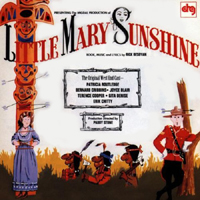 Original London Cast, 1962 (Capitol/DRG)
Original London Cast, 1962 (Capitol/DRG)  (4 / 5) One of the earliest Off-Broadway musical clicks, Little Mary Sunshine didn’t knock out the Brits when it opened at the Comedy, the small West End theater that’s now known as the Harold Pinter — this so-so reception despite the fact that the sunny-humored title character was played by Patricia Routledge, six years before she came to Manhattan and became the darling of the day in Darling of the Day. As evidenced by the cast recording, there was no attempt by anyone in this Paddy Stone-directed production to veer from native Mayfair accents to sound like Colorado denizens, including Native Americans speaking broken English. (The cliché portrayal of Native Americans would no doubt present a political correctness problem in a contemporary revival stateside.) The London cast sings Rick Besoyan’s score as if it were an opera or an operetta. Predictably, Routledge, ever the comedienne, gives a rollicking performance as Mary. The only other familiar name (to some, at least) is Bernard Cribbins. He and all the others, conducted by Philip Mirwell, are pristine in their delivery. Although Besoyan cited American operetta influences for this musical, the English accents here often conjure thoughts of W. S. Gilbert and Sir Arthur Sullivan — the fathers, grandfathers, and now great-great-grandfathers of this whole shebang. — D.F.
(4 / 5) One of the earliest Off-Broadway musical clicks, Little Mary Sunshine didn’t knock out the Brits when it opened at the Comedy, the small West End theater that’s now known as the Harold Pinter — this so-so reception despite the fact that the sunny-humored title character was played by Patricia Routledge, six years before she came to Manhattan and became the darling of the day in Darling of the Day. As evidenced by the cast recording, there was no attempt by anyone in this Paddy Stone-directed production to veer from native Mayfair accents to sound like Colorado denizens, including Native Americans speaking broken English. (The cliché portrayal of Native Americans would no doubt present a political correctness problem in a contemporary revival stateside.) The London cast sings Rick Besoyan’s score as if it were an opera or an operetta. Predictably, Routledge, ever the comedienne, gives a rollicking performance as Mary. The only other familiar name (to some, at least) is Bernard Cribbins. He and all the others, conducted by Philip Mirwell, are pristine in their delivery. Although Besoyan cited American operetta influences for this musical, the English accents here often conjure thoughts of W. S. Gilbert and Sir Arthur Sullivan — the fathers, grandfathers, and now great-great-grandfathers of this whole shebang. — D.F.
Listen To My Heart: The Songs of David Friedman
 Original Cast, 2003 (Midder Music, 2CDs)
Original Cast, 2003 (Midder Music, 2CDs)  (4 / 5) Skillfully programmed and directed by Mark Waldrop, this revue had a brief run Upstairs at Studio 54. Happily, it yielded a “live” cast album that will bring pleasure to those who saw the show and introduce some wonderful music to those who missed it. As presented onstage and in this two-disc set, Listen to My Heart demonstrates that David Friedman’s range as a composer-lyricist is greater than he’s often given credit for. It’s true that much of his output falls into two general categories: life-affirming anthems and heart-on-the-sleeve love ballads. Some of the lyrics of these songs can be difficult for the more cynical among us to take, but Friedman’s sincerity is genuine, and there are several other types of songs included here. “Live It Up,” for example, is a funny up-tune that’s very different from two standout, country-inflected numbers: the witty “If You Love Me, Please Don’t Feed Me”(written with Robin Boudreau and Scott Barnes) and the heartfelt “My White Knight” (not to be confused with the song of the same title from The Music Man). Given that so much of Friedman’s work would seem to mark him as a paragon of positive thinking, one of his most surprising creations is “Catch Me,” a poignant plea for help from a person on the brink of suicide. In complete contrast, there are some hilariously funny “Jewish humor” numbers, performed to the hilt by Alix Korey. Happily, her rendition of “My Simple Wish” (a.k.a. “My Simple Christmas Wish”), long the stuff of cabaret legend, is preserved here. Thanks to this two-CD recording’s excellent sound quality, all of the performances can be fully appreciated: Allison Briner’s soulful delivery of “My White Knight”; Joe Cassidy’s powerful “Catch Me” and Michael Hunsaker’s sympathetic response, “I Can Hold You”; and Anne Runolfsson’s “What I Was Dreamin’ Of” and “We Can Be Kind,” which show her to be one of the finest singing actresses of her generation. First-rate ensemble work and three songs played and sung beautifully by Friedman himself complete the listening experience. — Michael Portantiere
(4 / 5) Skillfully programmed and directed by Mark Waldrop, this revue had a brief run Upstairs at Studio 54. Happily, it yielded a “live” cast album that will bring pleasure to those who saw the show and introduce some wonderful music to those who missed it. As presented onstage and in this two-disc set, Listen to My Heart demonstrates that David Friedman’s range as a composer-lyricist is greater than he’s often given credit for. It’s true that much of his output falls into two general categories: life-affirming anthems and heart-on-the-sleeve love ballads. Some of the lyrics of these songs can be difficult for the more cynical among us to take, but Friedman’s sincerity is genuine, and there are several other types of songs included here. “Live It Up,” for example, is a funny up-tune that’s very different from two standout, country-inflected numbers: the witty “If You Love Me, Please Don’t Feed Me”(written with Robin Boudreau and Scott Barnes) and the heartfelt “My White Knight” (not to be confused with the song of the same title from The Music Man). Given that so much of Friedman’s work would seem to mark him as a paragon of positive thinking, one of his most surprising creations is “Catch Me,” a poignant plea for help from a person on the brink of suicide. In complete contrast, there are some hilariously funny “Jewish humor” numbers, performed to the hilt by Alix Korey. Happily, her rendition of “My Simple Wish” (a.k.a. “My Simple Christmas Wish”), long the stuff of cabaret legend, is preserved here. Thanks to this two-CD recording’s excellent sound quality, all of the performances can be fully appreciated: Allison Briner’s soulful delivery of “My White Knight”; Joe Cassidy’s powerful “Catch Me” and Michael Hunsaker’s sympathetic response, “I Can Hold You”; and Anne Runolfsson’s “What I Was Dreamin’ Of” and “We Can Be Kind,” which show her to be one of the finest singing actresses of her generation. First-rate ensemble work and three songs played and sung beautifully by Friedman himself complete the listening experience. — Michael Portantiere

